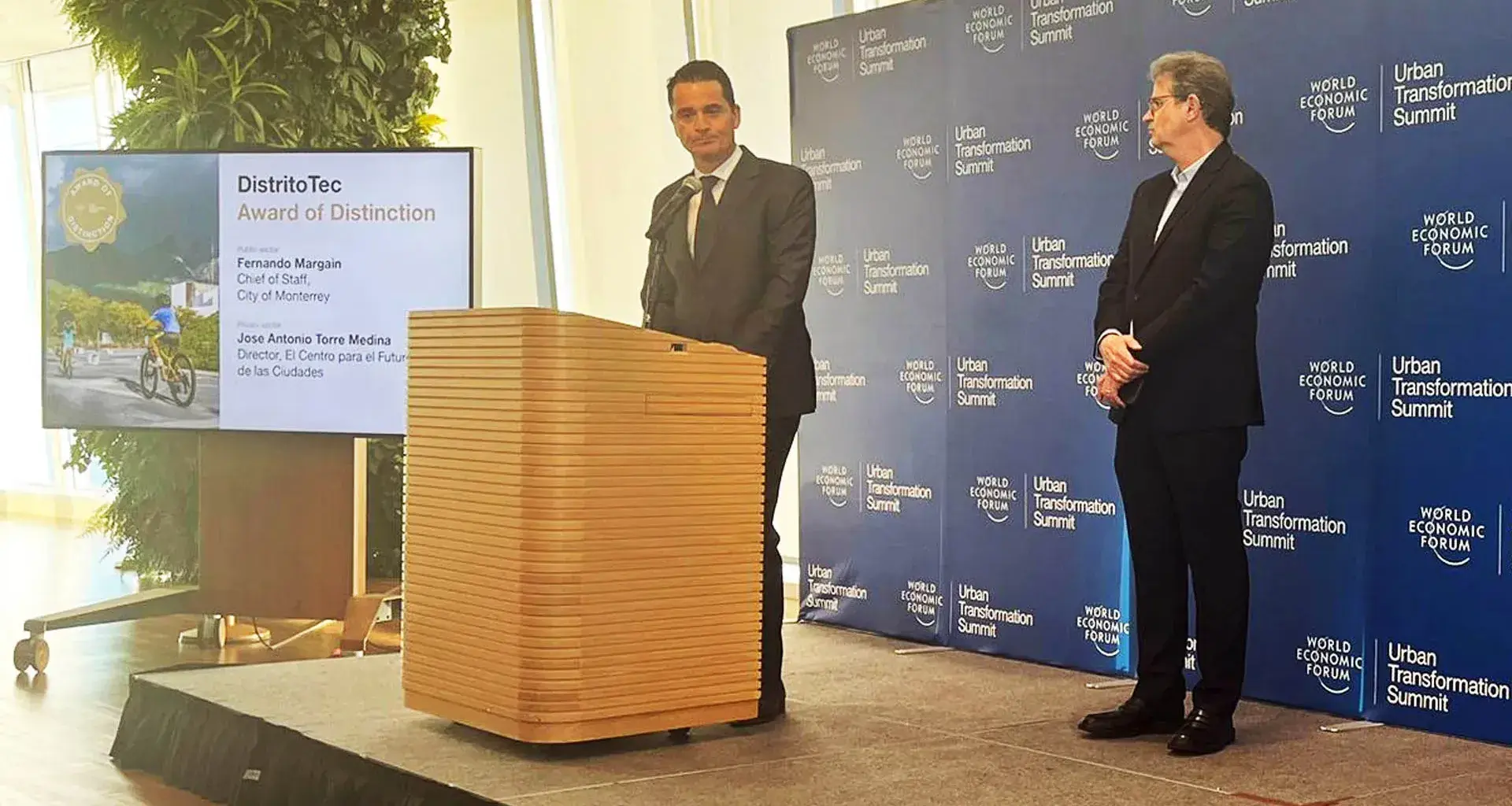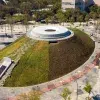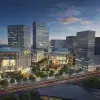The distritotec initiative has received an Award of Distinction for urban transformation in the “Public-Private Collaboration” category from the World Economic Forum (WEF) and UN-Habitat through the Global Partnership for Local Investment, the first time Mexico has received this distinction.
This award is given to successful models of collaboration between public and private sectors that display best practices, lessons learned, and the creation of new partnerships to aid the transformation of cities, with the potential to be scalable worldwide.
Speaking at the 2024 Urban Transformation Summit held in San Francisco, California, José Antonio Torre, Director of the Tec’s Center for the Future of Cities, gave thanks for the award and said that the joint efforts of public and private sectors, along with public participation, were essential to creating this initiative.
“On behalf of Tec de Monterrey, I express our most sincere thanks to the World Economic Forum and UN-Habitat for seeing the value that distritotec has generated for the community, society, and people who live and come together within it,” said Torre.
“This award inspires us to continue promoting interdisciplinary and multisectoral innovation and research for urban transformation, turning our cities into more sustainable, human, and prosperous environments,” he remarked.
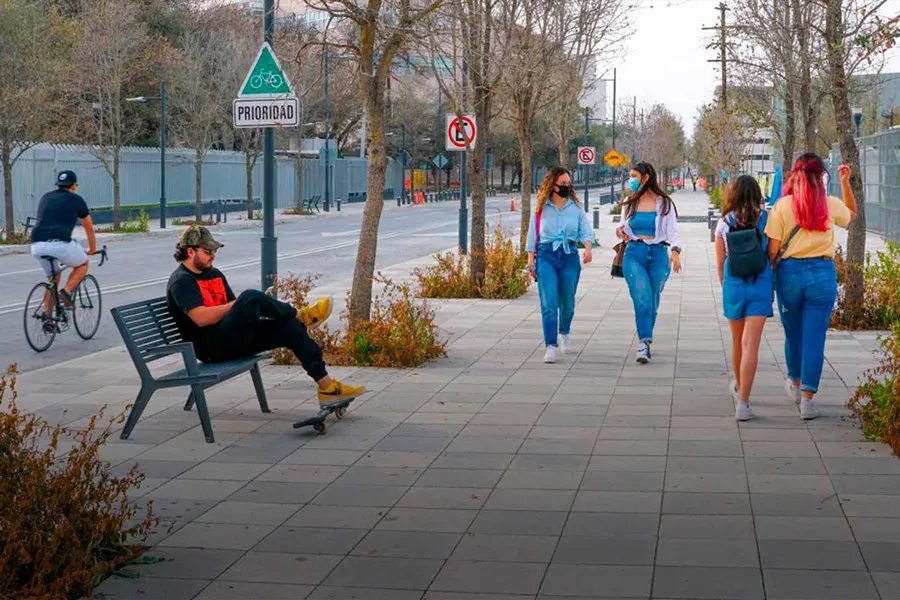
Tec de Monterrey works with strategic partners from organizations, governments, and civil society to enable distritotec to be an urban community in which the quality of life of its surroundings and its capacity for innovation fuel each other through the power of collaboration.
WEF and UN-Habitat praise work of distritotec
During the Summit’s fourth edition, the Global Partnership for Local Investment (co-founded by the WEF and UN-Habitat) awarded distinctions to three urban transformation initiatives in cities around the world under three categories: public-private collaboration, sustainable transport, and local impact.
This year, distritotec from Monterrey, Nuevo León, Mexico, received an award in the public-private collaboration category.
A project from Pittsburgh, Pennsylvania, U.S.A., was given a distinction in the “Sustainable Transport” category for its parking lot management system, while Bristol, U.K., was recognized in the “Local Impact” category for its electricity decarbonization initiative.
In previous years, it has recognized city projects such as DC Water’s Environmental Impact Bond in Washington D.C., Healthy Greens JC in Jersey City, and Future Automated Bus Urban Level Operation Systems in Helsinki.
Also attending the event were Mario Adrián Flores, Monterrey Vice President and General Director of Monterrey Campus; Fernando Margáin Sada Chief of Staff for the City of Monterrey Government; and Edgar Olaiz Ortiz, General Director of the Municipal Institute of Urban Planning and Community Living (IMPLANC).
The aim of these summits is to provide a platform to highlight initiatives that have the capacity to form partnerships with local governments, experimentation with new approaches to joint planning, and co-investment to seek the creation of more sustainable, inclusive, and resilient cities.

According to the Center for the Future of Cities, the success of distritotec stems from the collaboration between public, private, and community stakeholders.
In this collaboration, the Tec works with the municipality of Monterrey, local residents, companies, and organizations such as the FEMSA Foundation.
“The community has provided the impetus for this initiative, turning distritotec into an example of social organization and community commitment to a public-private project,” said the director.
Joint investment totaling over 18 billion pesos has managed to transform the district into a vibrant, resilient, and dynamic environment.
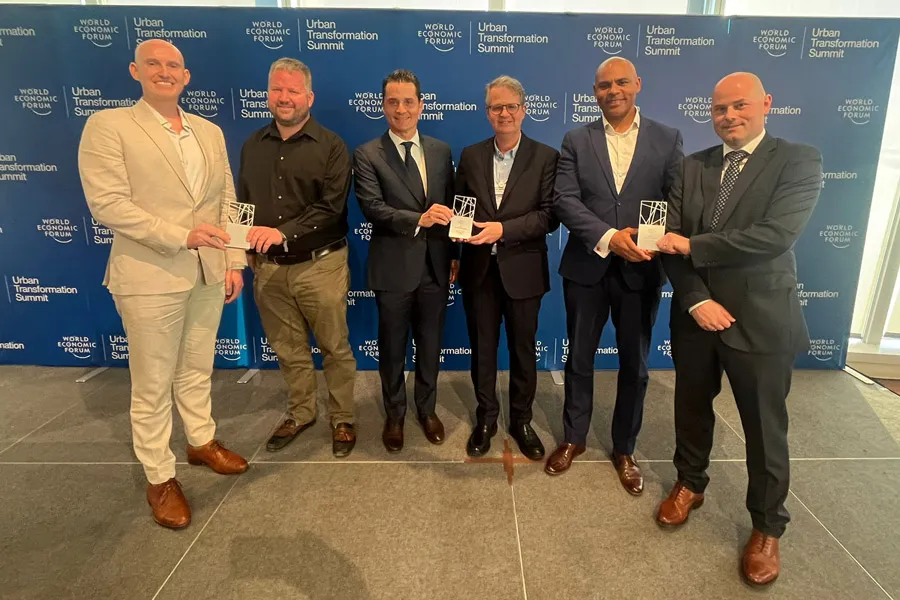
distritotec: Transforming realities through the power of collaboration
distritotec is an urban transformation project in the municipality of Monterrey that covers an area of 452 hectares, consisting of 24 neighborhoods with 30,000 inhabitants.
This initiative seeks to create a safer and more inclusive urban environment by aligning university infrastructure with the needs of the community.
Since 2014, it has implemented a strategic plan that includes a public trust, a specialized neighborhood council, and sustained investment in urban development, which has brought about tangible changes.
“The municipality of Monterrey has been a key partner since the start of this initiative,” said Torre during his acceptance speech.
“Their collaboration has been essential for integrating the regulatory, legal, and financial instruments that have made this project a reality,” he added.
Some of the key projects highlighted include programs for entire streets and new public spaces, promoting sustainable mobility, environmental responsibility, and improved quality of life.
“To the community, society, and those who live and work in distritotec: your participation has been at the heart of this process.” José Antonio Torre
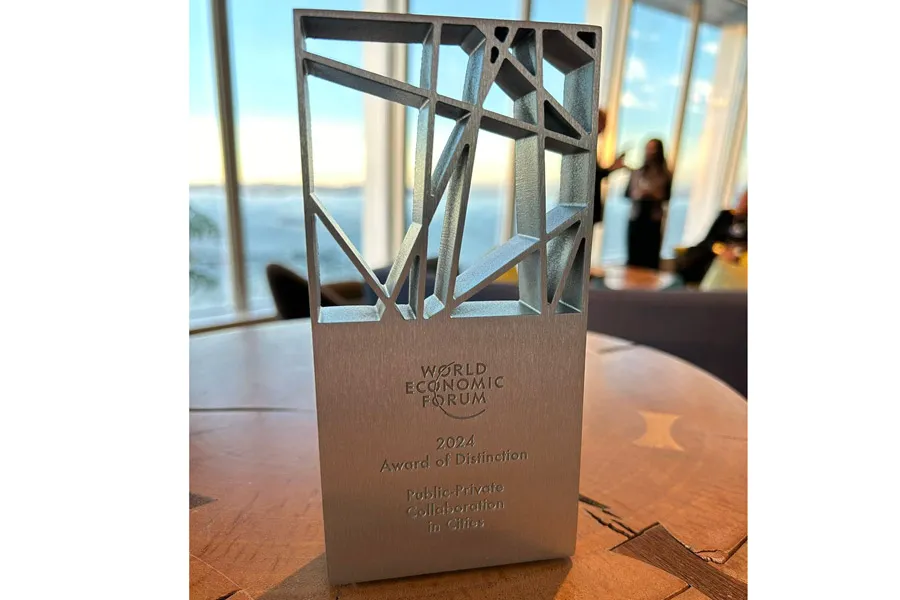
Community, urban equality, and innovation: The essence of distritotec
Its community collaboration and activation projects include Casa Naranjos, “Callejero,” and “Picnic Cinema,” which have fostered social connections and strengthened the fabric of the community through shared experiences.
“At the Tec, we believe in research and innovation to accomplish true urban transformation and turn our cities into prosperous, inclusive, and sustainable environments,” said Torre.
As proof of this, the initiative has in turn helped to reverse housing abandonment, leading to an increase of 56% in the population and a significant reduction in vacant properties, from 36% in 2010 to just 9% in 2020.
The distritotec initiative was also a finalist for the 2020-2021 WRI Ross Center Prize, standing out due to its global relevance in the fight against urban inequality and climate change.
According to the Center, the Expedition building will be inaugurated in December 2024, marking a milestone as the first building to specialize in technological innovation in the district.
During his speech, Torre thanked and praised the constant involvement and collaborative work of Fernando Margáin, on behalf of the municipality of Monterrey; Edgar Olaiz, Director of IMPLANC; and many other people from the public sector who have committed themselves to continuing the vision of distritotec.
“To the community, society, and those who live and work in distritotec: your participation has been at the heart of this process,” said Torre.
The initiative has helped to increase the population by 56% and significantly reduce empty properties, from 36% in 2010 to just 9% in 2020.
About the 2024 Urban Transformation Summit
The 2024 Urban Transformation Summit is an event organized by the World Economic Forum that focuses on the urban transformation and sustainable development of cities.
This aim of this summit is to bring together more than 250 leaders of companies, organizations, governments, and civil society from over 25 countries to discuss and promote the search for solutions to create prosperous, inclusive, and sustainable cities.
It also seeks to foster innovative collaborations for tackling urban challenges such as climate change, mobility, housing, and social inclusion.
These are chiefly addressed through topics such as sustainable re-urbanization, mobility transformation, innovation ecosystems, positive infrastructure for nature, and technological governance.
YOU MIGHT ALSO BE INTERESTED IN:

